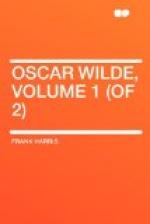A year or so after the first meeting between Oscar Wilde and Lord Alfred Douglas I heard that they were being pestered on account of some amorous letters which had been stolen from them. There was talk of blackmail and hints of an interesting exposure.
Towards the end of the year it was announced that Lord Alfred Douglas had gone to Egypt; but this “flight into Egypt,” as it was wittily called, was gilded by the fact that a little later he was appointed an honorary attache to Lord Cromer. I regarded his absence as a piece of good fortune, for when he was in London, Oscar had no time to himself, and was seen in public with associates he would have done better to avoid. Time and again he had praised Lord Alfred Douglas to me as a charming person, a poet, and had grown lyrical about his violet eyes and honey-coloured hair. I knew nothing of Lord Alfred Douglas, and had no inkling of his poetic talent. I did not like several of Oscar’s particular friends, and I had a special dislike for the father of Lord Alfred Douglas. I knew Queensberry rather well. I was a member of the old Pelican Club, and I used to go there frequently for a talk with Tom, Dick or Harry, about athletics, or for a game of chess with George Edwards. Queensberry was there almost every night, and someone introduced me to him. I was eager to know him because he had surprised me. At some play,[11] I think it was “The Promise of May,” by Tennyson, produced at the Globe, in which atheists were condemned, he had got up in his box and denounced the play, proclaiming himself an atheist. I wanted to know the Englishman who could be so contemptuous of convention. Had he acted out of aristocratic insolence, or was he by any possibility high-minded? To one who knew the man the mere question must seem ridiculous.
Queensberry was perhaps five feet nine or ten in height, with a plain, heavy, rather sullen face, and quick, hot eyes. He was a mass of self-conceit, all bristling with suspicion, and in regard to money, prudent to meanness. He cared nothing for books, but liked outdoor sports and under a rather abrupt, but not discourteous, manner hid an irritable, violent temper. He was combative and courageous as very nervous people sometimes are, when they happen to be strong-willed—the sort of man who, just because he was afraid of a bull and had pictured the dreadful wound it could give, would therefore seize it by the horns.
The insane temper of the man got him into rows at the Pelican more than once. I remember one evening he insulted a man whom I liked immensely. Haseltine was a stockbroker, I think, a big, fair, handsome fellow who took Queensberry’s insults for some time with cheerful contempt. Again and again he turned Queensberry’s wrath aside with a fair word, but Queensberry went on working himself into a passion, and at last made a rush at him. Haseltine watched him coming and hit out in the nick of time; he caught Queensberry full in the face and literally




